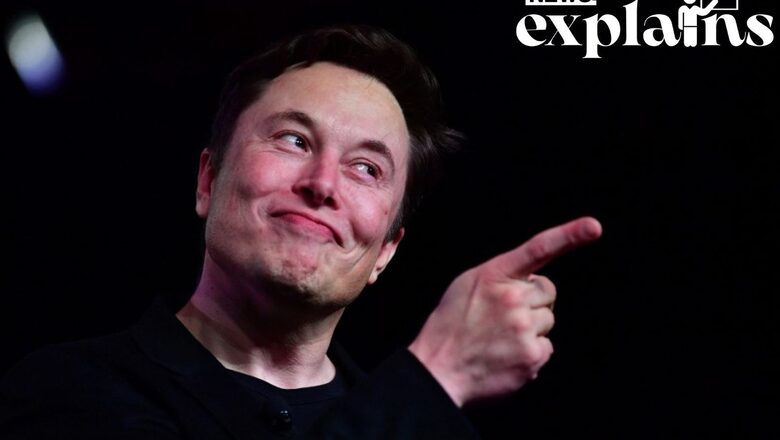
views
Tesla shares fell to their lowest level in more than two years on Tuesday, marking the company’s worst day in eight months, as Elon Musk’s electric carmaker faces a difficult financial period.
Since the beginning of October, the company’s stock has lost more than half of its value. Investors are concerned that Musk’s time is being consumed by Twitter now that he is the social network’s owner and CEO.
Since Musk Took Over Twitter…
His tenure as platform CEO has been marked by chaos as he implements – and frequently reverses – a slew of new policies. Musk recently stated that he would find a new CEO to replace him after the majority of Twitter users voted for him to resign. According to experts, his erratic behaviour has eroded trust in Tesla, with shares down 73% since November 2021, a report by Guardian said.
Tuesday’s loss, which saw Tesla shares fall 11.4%, came on the heels of a Reuters report that the company planned to run a reduced production schedule at its Shanghai plant in January. This news raised concerns about a drop in demand in the world’s largest car market, as the number of Covid-19 infections in China continues to rise.
“There’s no doubt there are demand concerns,” Great Hill Capital chairman Thomas Hayes told the Guardian, citing a reduction in delivery forecasts from Chinese rival Nio in the key market.
Hayes also stated that Tesla’s stock is in the midst of a “perfect storm” of high interest rates, tax-loss selling, and share sales by some funds that own a significant amount of Tesla stock.
What is Tax Loss Selling?
When an investor sells an asset at a capital loss in order to reduce or eliminate the capital gain realised by other investments for income tax purposes, this is known as tax-loss selling.
Musk previously attributed Tesla’s recent struggles to rate hikes from the Federal Reserve, stating “people will increasingly move their money out of stocks into cash, thus causing stocks to drop”.
This year, the billionaire sold nearly $4 billion of his own Tesla stock to fund the acquisition of Twitter, which he paid $44 billion for. He said in mid-December he would not sell additional Tesla stock “for at least 18 to 24 months”. Financial filings, however, show that he sold millions after making similar promises in April 2022.
Analysts have speculated that Musk could be asked to resign as a Tesla executive over his actions on Twitter, as he is already facing a lawsuit over his alleged failure to focus on Tesla due to outside ventures.
What is the Controversy Over Musk’s Tesla
A report by CNN Business states that its common misconception that billionaire’s obsession with Twitter is the primary reason Tesla shares have lost so much value this year. The author argues that Tesla’s steep stock drop this week demonstrated that Musk’s car company’s problems extend far beyond Twitter.
Even as Musk suggests stepping down as CEO on Twitter, investors are concerned that Tesla’s sales and profit outlook is deteriorating. Tesla has announced a rare sale, indicating a drop in demand. The company initially offered a $3,750 discount earlier this month for buyers who take delivery of a vehicle before the end of the year. Tesla then increased the rebate to $7,500 on Thursday.
“Tesla clearly is starting to see demand cracks in China and the US at a time when EV competition is increasing across the board,” Dan Ives, a Wedbush Securities tech analyst and Tesla bull who reduced his price target for the stock from $250 to $175 on Friday told CNN Business.
Twitter is Not the Only Factor
Part of the issue with Tesla’s stock price is that some critics question whether the company was ever worth the trillion-dollar valuation it had at the start of the year, the report said. Tesla was worth more than the world’s 12 largest automakers combined at its peak, despite having a fraction of their sales. It is now worth $399 billion.
“It got ahead of itself in the short term,” Gene Munster of Loup Ventures, a Tesla supporter told CNN Business.
Tesla’s growth prospects – a target of 50% annual sales growth – aided in driving that valuation. It admitted in October that it would fall short of its sales target for the year.
Musk’s reputation as a genius who would disrupt the massive global auto industry propelled the stock to dizzying heights, rising 743% in 2020 alone.
“Tesla was viewed as a disruptive technology company, not an automaker, and a large portion of that premium is related to Musk,” Ives explained.
Critics of Tesla have also claimed that much of its exorbitant valuation was based on promises made by Musk about future products, many of which were delivered years later.
A prime example is the Tesla pickup truck, the Cybertruck, which was first unveiled three years ago with promises of production beginning in 2021. It is now scheduled to begin production next year, with a production ramp-up in 2024, putting it years behind other electric pickup offerings from Ford and upstart EV maker Rivian, both of which have electric pickups on the market today. It may also lag behind General Motors’ planned electric pickup offerings.
Investors have also been disappointed that Musk appears to be paying for a large portion of his $44 billion acquisition of Twitter by selling Tesla stock. Musk, Tesla’s largest shareholder, has sold $23 billion in Tesla stock since his Twitter stake became public in April.
Another Twitter factor: Musk named himself CEO of Twitter, his third major company after Tesla and SpaceX. As a result, many people assumed Musk’s loss of focus on Tesla had frightened the company’s former Wall Street supporters.
Read all the Latest Explainers here


















Comments
0 comment